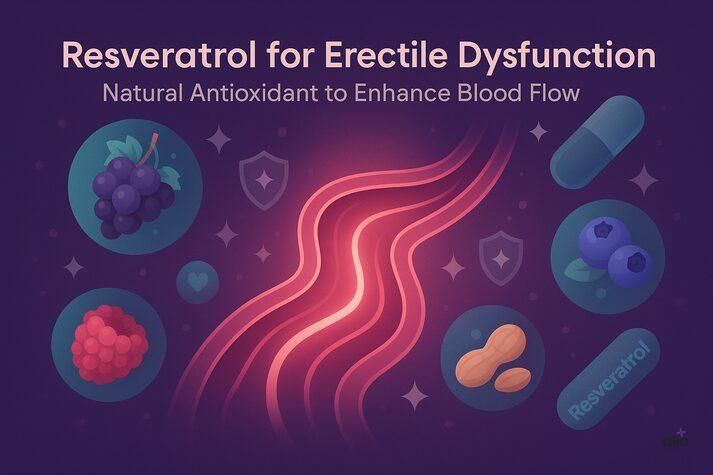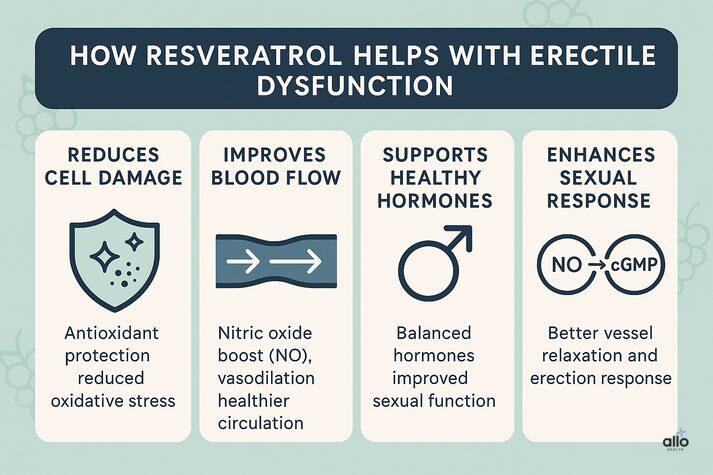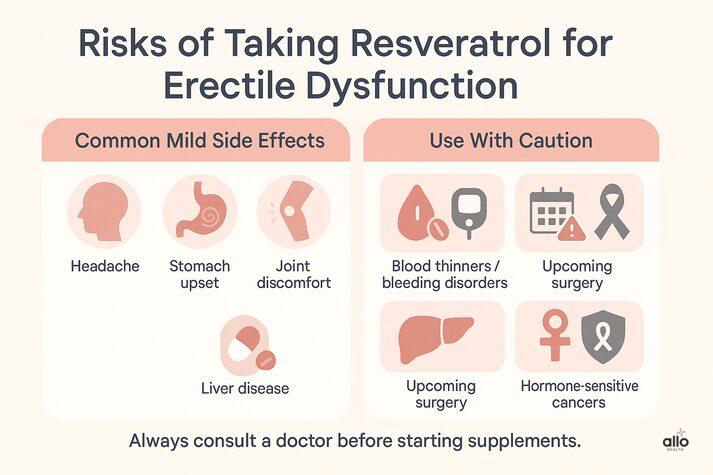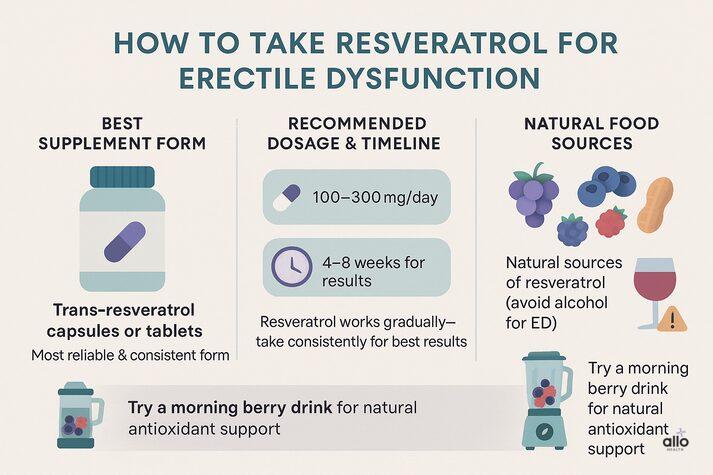Resveratrol for Erectile Dysfunction: Natural Antioxidant to Enhance Blood Flow
Written by Dr. Pranitha Bangera

Dr. Pranitha Bangera is a gold-medalist healthcare professional with an elite foundation in clinical training and patient care. A researcher at heart, she specializes in creating high-impact, research-driven medical content that empowers readers through accessible patient education. Dr. Bangera focuses on the intersection of digital health and clinical communication, specifically within the fields of sexual health and mental well-being. Her work is dedicated to making complex medical innovations understandable and trustworthy for a global audience.
•
November 27, 2025
Our experts continually monitor the health and wellness space, and we update our articles when new information becomes available.

Quick Read
If you’re wondering whether resveratrol can help with erectile dysfunction, the short answer is: yes, it may help, especially when ED is linked to cell damage, poor blood flow, or age-related changes. Research shows that resveratrol improves circulation to the penis and may enhance sexual response, but it works gradually and is not a standalone cure. Most studies suggest a resveratrol erectile dysfunction dosage of 100–300 mg per day, with results appearing after 4–8 weeks. It’s generally safe for healthy individuals, but not recommended for those on blood thinners, diabetes medications, or with certain health conditions. If ED persists, a sexual health expert can guide you toward the right combination of treatments for long-term improvement.
In recent years, natural compounds like resveratrol, a powerful ingredient found in grapes and berries, have gained a lot of attention for their potential to help with erectile dysfunction. But does it truly work, or is it just another overhyped supplement? Studies show that resveratrol may improve erection quality by reducing cell damage in penile tissue, increasing blood flow to the penis, and helping the penis respond better during sexual stimulation. While it's not a quick-fix or a replacement for medical ED treatments, it may offer gentle, meaningful support, especially when ED is tied to inflammation or age-related changes. In this article, we’ll explore what the research says, how resveratrol actually works, who should avoid it, the ideal resveratrol erectile dysfunction dosage, and simple ways to incorporate it into your routine.
Allo asks
Would you consider trying resveratrol for ED?
Can Resveratrol Help With Erectile Dysfunction?
Yes, Resveratrol can help with erectile dysfunction, but it isn’t a guaranteed or standalone cure. A study shows that resveratrol can help improve erections, especially when ED is linked with damage to penile tissue (oxidative stress) in radiotherapy-induced ED. [1] Resveratrol has been shown to improve different aspects of erectile function, including sexual response, blood flow, and hormones, mostly because of its strong anti-inflammatory effects. [2] Another study found that taking the supplement L-citrulline (800 mg/day) along with trans-resveratrol (300 mg/day) noticeably improved erection firmness, confidence, and satisfaction in men who didn’t get good results from ED medicines like Viagra earlier. [3]
How Does Resveratrol Help With Erectile Dysfunction?
Resveratrol supports erection health by targeting several key biological pathways that are often disrupted in ED.
1. Reduces Cell Damage
Resveratrol is a strong antioxidant. Think of it as a natural fighter who defends your body against harmful substances. It neutralises these "threats" and protects penile tissue from cell damage, also called oxidative stress, which is one of the major reasons blood flow and nerve responses weaken in ED. It also helps reduce inflammation in the urinary and reproductive systems (urogenital tract). [3]
2. Improves Blood Flow to the Penis
Resveratrol boosts nitric oxide (NO), the chemical that relaxes blood vessels in the penis. More NO means better blood flow and firmer erections. It does this by activating a certain chemical (endothelial nitric oxide synthase) that increases the production of nitric oxide in the erectile tissues of the penis (corpus cavernosum). [4]
3. Supports Healthy Hormones
Some studies suggest resveratrol may support testosterone, the male hormone responsible for sex drive. It is important to note that while it may support hormonal balance, it shouldn’t be used as a replacement for testosterone therapy or testosterone replacement therapy when those are medically indicated. [5]
4. Improves Sexual Response
Resveratrol enhances the same natural processes that Viagra is known to work on( the NO–cGMP signaling pathway). This pathway controls how well the blood vessels in the penis relax and open up during sexual arousal. This indicates that resveratrol helps the body respond more effectively to sexual stimulation by supporting the chemical signals needed for a strong, healthy erection. [4] While these findings are exciting, larger, long-term human trials are needed before resveratrol can be considered a first-line ED treatment.

Risks of Taking Resveratrol for Erectile Dysfunction
At standard doses, resveratrol is generally safe. Possible mild side effects include:
- Headache
- Stomach upset
- Joint discomfort
However, long-term data are still limited, especially in diabetic patients and men with cardiovascular system diseases.
Who Should Not Take Resveratrol for Erectile Dysfunction
Resveratrol may not be suitable for everyone. Avoid or use caution if you have:
- Bleeding disorders or take blood thinners
- Diabetes medications (risk of interaction)
- Liver disease
- An upcoming surgery
- Hormone-sensitive cancers, such as prostate cancer, or those undergoing androgen deprivation therapy
Always speak with a doctor before starting any supplements.

How to Take Resveratrol for Erectile Dysfunction
If you’re considering resveratrol for erectile dysfunction, the supplement form matters. Trans-resveratrol capsules or tablets are the most reliable option because they provide a consistent dose and are easy for the body to absorb. [3] Most studies conclude that the resveratrol erectile dysfunction dosage is 100–300 mg per day. [3] This range is generally considered safe. Resveratrol isn’t a quick fix; it works gradually. If it helps, you’ll typically notice improvements in 4–8 weeks of consistent daily use. [3] You can also get resveratrol naturally from dietary sources like:
- Grapes
- Blueberries & raspberries
- Peanuts
- Red wine (but alcohol can worsen ED, so it is not recommended as a resveratrol source)
Here's a simple recipe to incorporate resveratrol into your diet:
Berry Drink
Ingredients:
- ½ cup blueberries
- ½ cup red grapes
- 4–5 raspberries
- 1 teaspoon lemon juice
- 1 cup water or coconut water
- Honey (optional)
How to make:
- Add all ingredients to a blender.
- Blend until smooth.
- Drink fresh in the morning for a natural antioxidant boost.
Many experts believe resveratrol works best as part of a bigger strategy, especially alongside lifestyle changes, exercise, weight management, sleep improvement, or in combination with supplements like L-citrulline. Supplements are not the first-line treatment for erectile dysfunction. If you’re experiencing ongoing ED, it’s best to consult a sexual health expert. They can help identify the underlying cause and guide you toward the right treatment options, whether that’s PDE5 inhibitors, vacuum erection devices, or, in some cases, procedures like penile prosthesis implantation.
If you’re thinking of trying resveratrol, use it as part of a bigger plan. Supplements work best when we're also improving sleep, movement, and heart health.

Conclusion
Resveratrol is not a “cure” for erectile dysfunction, but it shows real scientific promise, especially for ED linked to oxidative stress, diabetes, aging, or poor vascular health. Its antioxidant and blood vessel supporting effects help protect penile tissue, improve nitric oxide availability, and support healthy blood flow to the penis. For some men, resveratrol may be a helpful adjunct to traditional ED treatments. For others, it may offer little to no improvement. The key is to approach it as one piece of a bigger picture, not a standalone fix.
Disclaimer
The following blog article provides general information and insights on various topics. However, it is important to note that the information presented is not intended as professional advice in any specific field or area. The content of this blog is for general educational and informational purposes only. The content should not be interpreted as endorsement, recommendation, or guarantee of any product, service, or information mentioned. Readers are solely responsible for the decisions and actions they take based on the information provided in this blog. It is essential to exercise individual judgment, critical thinking, and personal responsibility when applying or implementing any information or suggestions discussed in the blog.
Most Asked Questions
How long does it take for resveratrol to start working?
Most people need 4–8 weeks of consistent daily use to see any potential improvement. It works slowly by supporting vascular health, not instantly like ED medicines.
What is the right resveratrol erectile dysfunction dosage?
Most studies suggest 100–300 mg of trans-resveratrol per day. This range is considered safe and is commonly used in research on sexual function.
Can I take resveratrol with Viagra or other ED medications?
Yes, and some studies suggest the combination may help men who didn’t get full results from ED medications alone. Still, always check with your doctor before combining treatments.
Can I get enough resveratrol to help with ED from food?
Foods like grapes and red wine contain resveratrol, but the amount is very small. You would need large quantities to match supplement doses. Red wine is not recommended for ED because alcohol can worsen erections. Always consult a doctor before starting supplements.
Does resveratrol increase testosterone?
Some studies suggest a small supportive effect, but resveratrol is not a reliable testosterone booster and shouldn’t replace medical testosterone therapy
Will resveratrol work if my ED is caused by stress or performance anxiety?
Probably not. Resveratrol mainly supports blood flow and reduces cell damage, but there’s no evidence that it helps with psychological causes of ED. In these cases, therapy or stress-management strategies are usually more effective.
Sources
- 1.
Resveratrol treatment may preserve the erectile function after radiotherapy by restoring antioxidant defence mechanisms, SIRT1 and NOS protein expressions
- 2.
Efficacy of resveratrol in male urogenital tract dysfunctions: an evaluation of pre-clinical data
- 3.
Oral L-citrulline and Transresveratrol Supplementation Improves Erectile Function in Men With Phosphodiesterase 5 Inhibitors: A Randomized, Double-Blind, Placebo-Controlled Crossover Pilot Study
- 4.
Resveratrol, an activator of SIRT1, restores erectile function in streptozotocin-induced diabetic rats
- 5.
Resveratrol and Reproductive Health


